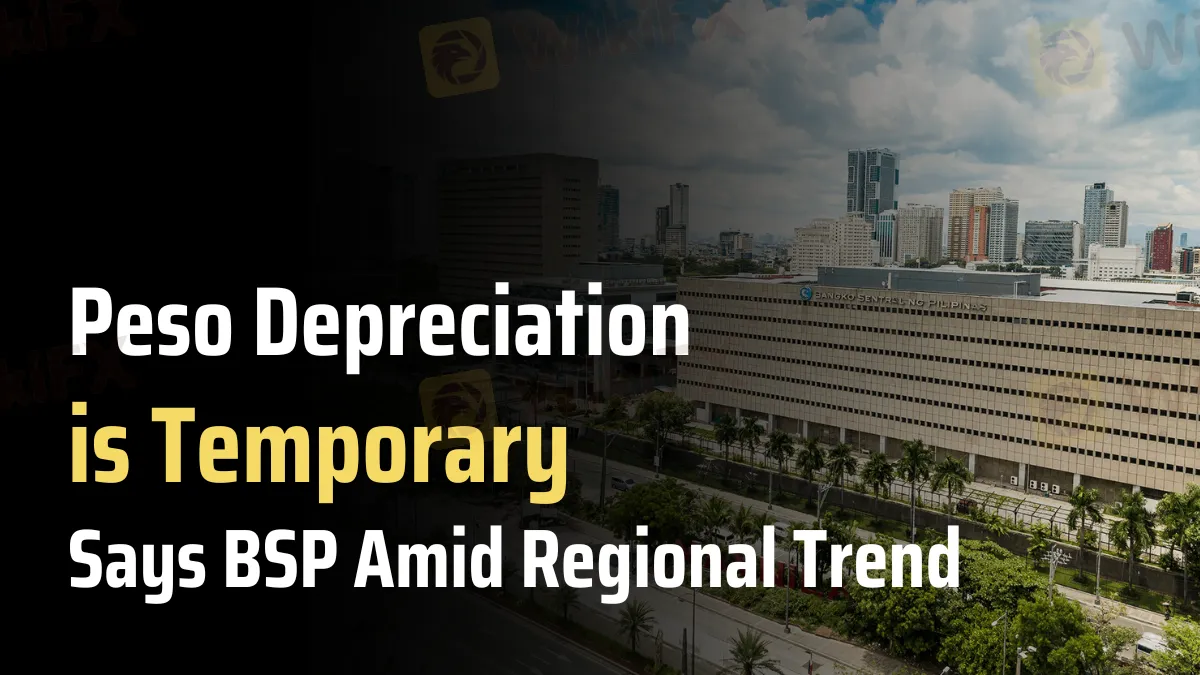简体中文
繁體中文
English
Pусский
日本語
ภาษาไทย
Tiếng Việt
Bahasa Indonesia
Español
हिन्दी
Filippiiniläinen
Français
Deutsch
Português
Türkçe
한국어
العربية
Peso Depreciation is Temporary, Says BSP Amid Regional Trend
Abstract:The BSP assures the public that the Philippine Peso's recent depreciation is temporary, reflecting a regional trend of weakening currencies against the US dollar.

In Manila, the Bangko Sentral ng Pilipinas (BSP) has reassured the public that the recent depreciation of the Philippine Peso (PH Peso) is just transitory, citing a larger regional trend of currencies falling versus the US dollar. This declaration comes after the peso fell to P58.27 to the dollar last week, the lowest level since November 2022.

During the Philippine Economic Briefing, BSP Senior Assistant Governor Iluminada Sicat addressed concerns, noting that the present depreciation is affected by external forces and would stabilize once these difficulties have been handled. Sicat indicated that this is merely a temporary situation. Once things settle down, the exchange rate will be determined by the fundamentals.
Sicat highlighted the regional context, saying, “We also look at what's going on in the neighborhood. Are we the only ones deteriorating or not?” This shows the BSP's view that the peso's fluctuation is part of a bigger trend impacting many currencies.
Despite the peso's dip to P58.27 on May 21, Sicat said that the government does not aim for a set exchange rate level, allowing market forces to define the rate. She did, however, emphasize the significance of monitoring market strains to avoid inflation expectations from increasing.

Ragnar Gudmundsson, the IMF's resident representative in the Philippines, agreed with this viewpoint, highlighting the significance of central banks making data-driven judgments. “Foreign exchange flexibility should be a priority,” he added, adding that combining it with a realistic inflation targeting framework is critical for investor confidence.
Gudmundsson said that despite possible concerns from global tensions and local wage demands, Philippine trends are mainly encouraging. He emphasized the need of addressing volatility induced by changes in the policies of the United States Federal Reserve. One of the recommended remedies is a combination of monetary and non-monetary measures, such as importing cheaper food goods to help needy families deal with high food costs.
The BSP's strategy is consistent with these guidelines, concentrating on preserving price stability while controlling market expectations. “We have to hold the line on that front... with a continued commitment to price stability,” said Gudmundsson.
Overall, the BSP and IMF announcements seek to reassure the public and investors that the present devaluation of the Philippine Peso is a transitory occurrence affected by larger regional dynamics and foreign causes. The BSP's commitment to market-driven exchange rates and price stability is central to its policy in this era of currency volatility.
Also, access the latest news here.

Disclaimer:
The views in this article only represent the author's personal views, and do not constitute investment advice on this platform. This platform does not guarantee the accuracy, completeness and timeliness of the information in the article, and will not be liable for any loss caused by the use of or reliance on the information in the article.
Read more

The Hidden Checklist: Five Unconventional Steps to Vet Your Broker
Forex broker scams continue to evolve, employing new tactics to appear credible and mislead unsuspecting traders. Identifying these fraudulent schemes requires vigilance and strategies beyond the usual advice. Here are five effective methods to help traders assess the legitimacy of a forex broker and avoid potential pitfalls.

Doo Financial Obtains Licenses in BVI and Cayman Islands
Doo Financial, a subsidiary of Singapore-based Doo Group, has expanded its regulatory footprint by securing new offshore licenses from the British Virgin Islands Financial Services Commission (BVI FSC) and the Cayman Islands Monetary Authority (CIMA).

CFI’s New Initiative Aims to Promote Transparency in Trading
A new programme has been launched by CFI to address the growing need for transparency and awareness in online trading. Named “Trading Transparency+: Empowering Awareness and Clarity in Trading,” the initiative seeks to combat misinformation and equip individuals with resources to evaluate whether trading aligns with their financial goals and circumstances.

Malaysian-Thai Fraud Syndicate Dismantled, Millions in Losses Reported
The Royal Malaysia Police (PDRM) has received 26 reports concerning the Nicshare and CommonApps investment schemes, both linked to a major fraudulent syndicate led by a Malaysian citizen. The syndicate’s activities came to light following the arrest of its leader by Thai authorities on 16 December.
WikiFX Broker
Latest News
ASIC Sues Binance Australia Derivatives for Misclassifying Retail Clients
WikiFX Review: Is FxPro Reliable?
Malaysian-Thai Fraud Syndicate Dismantled, Millions in Losses Reported
Trading frauds topped the list of scams in India- Report Reveals
AIMS Broker Review
The Hidden Checklist: Five Unconventional Steps to Vet Your Broker
Russia to Fully Ban Crypto Mining in 10 Regions Starting January 1, 2025
YAMARKETS' Jingle Bells Christmas Offer!
Why is there so much exposure against PrimeX Capital?
Doo Financial Expands Regulatory Reach with Offshore Licenses in BVI and Cayman Islands
Currency Calculator


